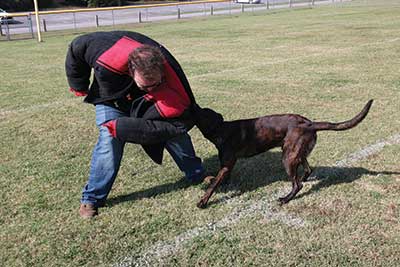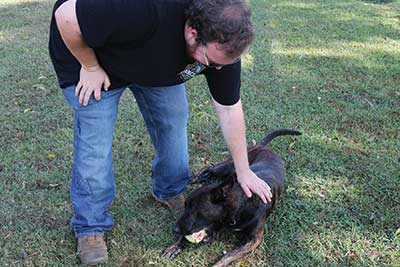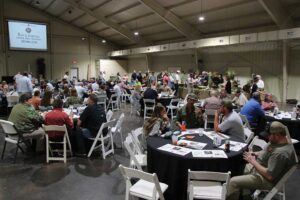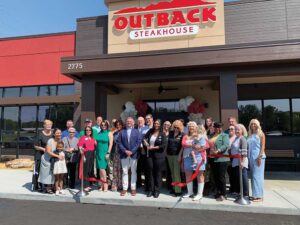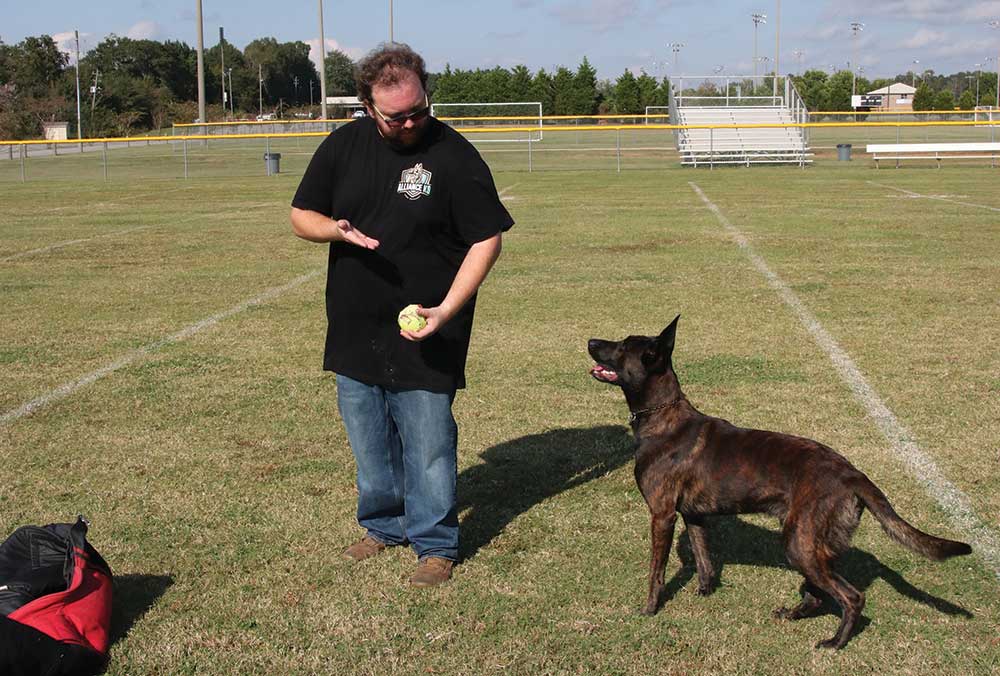
Dog trainer left computer coding to start dream business
Story and Photos by Graham Hadley
Last year, as the COVID virus presented businesses with difficult challenges, some entrepreneurs took the opportunity to move their lives in new directions.
Alex Allen, who had been in the tech industry, did just that, moving out from behind a desk all day to training dogs in everything from basic household obedience to drug and bomb detection and other professional police and security work.
Allen took the leap of faith, founding Alliance K9, working with some of the top trainers to hone his skills and is now open for business in St. Clair.
“With the lockdown, things were slowing down. I was working at a desk all day, and just wanted to do something new,” he said.
Allen did his training with Tarheel Canine school in Sanford, N.C., under trainer Jerry Bradshaw.
“It was kind of baptism by fire. They put you in there with the padded suit on. You came around a corner, and there was a dog. You could either handle it or not.”
Allen handled it, no problem, but admits the training can be intense.
“It’s on-the-job training and it’s fast-paced. They put you out there and see what you are made of.”
At one point, he was playing the “bad guy” during building search training, usually used by police and military.
“You are hiding in this dark room wearing the padded suit. And you can hear them going through the building, the dog’s feet on the floor. Then he scratches at your door, and you know this is it. The next second, uniformed officers storm the room, there are bright strobes, the whole thing.”
Since those first days, Allen has come a long way, continuing to fine tune his skills so he can be the very best trainer he can be – and that is no small task given the range of services he offers dog owners: pet obedience, personal protection, behavior modification, police and security, search and rescue, and much more.
Each skill takes a specific kind of training and tools – simple things like bright balls for teaching dogs to fetch and retrieve to special padded, bite-proof suits he wears to train dogs to take down suspects.
If that is not enough, Allen trains all breeds of dogs, and each of those has specific behavior characteristics that vary widely.
“Some of your smaller breeds (like terriers), I spend a lot of time just getting the dog to get involved in the training, getting them interested in the process. That can take a lot of time and patience,” he said. Other breeds, like his Dutch shepherd, Ranger, are very focused on their training and are well suited to police and security work.
Displaying his dog’s training at the soccer fields behind the Pell City Civic Center, Allen would throw an oversized tennis ball for Ranger, who would dash across the field, grab the ball and come barreling back to his trainer, who was now outfitted in the padded suit to practice take-down techniques.
For Ranger, Allen was his entire focus, even when a group of kids came out to an adjoining field to play football – an activity the year-old shepherd clearly thought would be great fun to take part in. But his training held. The kids were running all over the other end of the field, but the dog was all business, fetching, retrieving and practicing his takedowns and restraint moves on a suited-up Allen.
While most of the training is straight forward, some of the more complicated tasks, like drug and bomb searches, require more work and special equipment.
Some of the larger schools have special permitting that gives them access to real drugs and explosives to train the dogs with. Allen says he is not there yet, but there are legal alternatives to both drugs and explosives he is using now.
Particularly with the drugs, though, the alternatives are not the best option, and he hopes to have those permits in hand in the future.
“The problem with the fake drug scents is, take meth, for instance. The synthetic scents are just of the methamphetamine chemical. But in real life, those drugs are mixed and cut with all sorts of things like cleaning supplies. So, if the dog is looking for just the meth smell, they may miss the real thing because those other chemicals are not in the training scents,” he said.
For explosives, right now he and Ranger are just getting started, so he is using simple gunpowder.
“We have just started with that. I have him where he can find the explosive, but the trick is getting him to locate the gunpowder without digging for it. With explosives, you just want them to locate them, not actively start digging through stuff for them,” he said.
Allen prides himself in being able to work with all breeds and for all kinds of different training, whether he is helping a family obedience train a Chihuahua, someone who wants their dog trained for personal protection or working with law-enforcement agencies to make sure their K9 units are the best around.
That takes a lot of training for the dogs, but even more training for Allen, who continually works with schools and other trainers to sharpen his skills.
And he is quick to point out, a big part of the training, especially when it comes to professional K9 security dogs, picking out the right animal for the task and assessing their abilities and temperament are key. For those dogs, you want a steady, smart animal, preferably from a working breed that has the instincts.
“When we start working with a dog, that is one of the first things I look for,” he said. Since he has started, he has made a lot of progress in that regard, especially in spotting the “steady” dogs that have the ideal personalities for things like police work.
As is necessary for his new line of work, Allen is an avowed dog lover, and sees teaching and promoting responsible pet ownership as a responsibility he is more than willing to take on.
People need to research and learn about what kind of dog fits their lifestyle and schedule – working breeds need to be kept active and given “jobs” to do, or they don’t do well. Terrier breeds need to be given things to occupy their time, as well. Those breeds are not well suited to being left in apartments for long hours while their owners work.
Other breeds, like English bulldogs, are more suited to owners who might have longer working days. Beagles and spaniels tend to need regular social interaction.
“People need to know what they are getting themselves into with different breeds,” he said, and be willing to meet the needs of whatever pet they bring home. “I consider that a core part of what I do when I am working with people and their dogs,” he said.
Allen said he has, on more than one occasion, had to help owners – some of whom hired him to help train their dogs – find their pets new homes better fitted to their needs.
“I have never turned away a dog for training” or to help with a rescue animal finding a new home, he said.
That is all part of the job, and one that Allen loves.
On walking away from a career in computer coding and tech, Allen said he has absolutely no regrets.
“Not one. I love this,” he said.
Editor’s Note: You can learn more at AllianceK9.com











